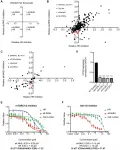(Press-News.org) What information is retained in a memory over time, and which parts get lost? These questions have led to many scientific theories over the years, and now a team of researchers at the Universities of Glasgow and Birmingham have been able to provide some answers.
Their new study, which is published today in Nature Communications, demonstrates that our memories become less vibrant and detailed over time, with only the central gist eventually preserved. Moreover, this 'gistification' of our memories is boosted when we frequently recall our recent experiences.
The work could have implications in a number of areas, including the nature of memories in post-traumatic stress disorder, the repeated questioning of eye-witness testimonies and even in best practice for exam studying.
While memories are not exact carbon copies of the past - remembering is understood to be a highly reconstructive process - experts have suggested that the contents of a memory could change each time we bring it back to mind.
However, exactly how our memories differ from the original experiences, and how they are transformed over time, has until now proven difficult to measure in laboratory settings.
For this study the researchers developed a simple computerised task that measures how fast people can recover certain characteristics of visual memories when prompted to do so. Participants learned word-image pairs and were later required to recollect different elements of the image when cued with the word. For example, participants were asked to indicate, as fast as possible, if the image was coloured or greyscale (a perceptual detail), or whether it showed an animate or inanimate object (a semantic element).
These tests, probing the quality of the visual memories, happened immediately after learning and also after a two-day delay. Reaction time patterns showed that participants were faster to recollect meaningful, semantic elements than surface, perceptual ones.
Julia Lifanov, lead author of the study from the University of Birmingham, said: "Many memory theories assume that over time, and as people re-tell their stories, they tend to forget the surface details but retain the meaningful, semantic content of an event.
"Imagine reminiscing about a pre-COVID dinner with a friend - you realize that you cannot recall the table décor but know exactly what you ordered; or you remember the conversation with the bartender, but not the colour of his shirt. Memory experts call this phenomenon 'semanticization'."
Prof Maria Wimber, senior author on the study from the University of Glasgow, said: "The pattern towards recollection of meaningful semantic elements we demonstrate in this study indicates that memories are biased towards meaningful content in the first place - and we have shown in previous studies that this bias is clearly reflected in brain signals too.
"Our memories change with time and use and that is a good and adaptive thing. We want our memories to retain the information that is most likely to be useful in the future, when we encounter similar situations."
The researchers found that the bias towards semantic memory content becomes significantly stronger with the passage of time, and with repeated remembering. When participants came back to the lab two days later, they were much slower at answering the perceptual-detailed questions, but they show relatively preserved memory for the semantic content of the images. However, the shift from detail-rich to more concept-based memories was far less pronounced in a group of subjects who repeatedly viewed the images, rather than being asked to actively bringing them back to mind.
The study has implications for probing the nature of memories in health and disease. It provides a tool to study maladaptive changes, for example in post-traumatic stress disorder where patients often suffer from intrusive, traumatic memories, and tend to over-generalize these experiences to novel situations. The findings are also highly relevant for understanding how eyewitness memories may be biased by frequent interviews and repeatedly recalling the same event.
The findings also demonstrate that testing yourself prior to an exam (for example, by using flashcards) will make the meaningful information stick for longer, especially when followed by periods of rest and sleep.
INFORMATION:
The study, 'Feature-specific reaction times reveal a semanticisation of memories over time and with repeated remembering' is published in Nature Communications. The work is funded by the European Research Council, the Economic and Social Sciences Research Council UK and the Midlands Integrative Biosciences Training Partnership.
The biological clock is present in almost all cells of an organism. As more and more evidence emerges that clocks in certain organs could be out of sync, there is a need to investigate and reset these clocks locally. Scientists from the Netherlands and Japan introduced a light-controlled on/off switch to a kinase inhibitor, which affects clock function. This gives them control of the biological clock in cultured cells and explanted tissue. They published their results on 26 May in Nature Communications.
Life on Earth has evolved under a 24-hour cycle; of light and dark, hot and cold. 'As a result, our cells are synchronized to these 24-hour oscillations,' says Wiktor Szymanski, Professor of Radiological Chemistry at the University ...
CLEVELAND, Ohio (May 26, 2021)--Carpal tunnel syndrome (CTS), which causes tingling and numbness in the hand, more commonly affects women than men and tends to peak around the age of menopause. A new study suggests the risk of severe CTS increases in women who underwent bilateral oophorectomy before menopause, and estrogen therapy didn't provide a protective effect. Study results are published online today in Menopause, the journal of The North American Menopause Society (NAMS).
Carpal tunnel syndrome is the most common nerve disorder in the upper body. Although predominately idiopathic in nature, an association with sex hormones has been suggested because of a higher incidence in women ...
Oncotarget published "Creation of a new class of radiosensitizers for glioblastoma based on the mibefradil pharmacophore" which reported that this group previously identified a calcium channel blocker, mibefradil, as a potential GBM radiosensitizer. They discovered that mibefradil selectively inhibits a key DNA repair pathway, alternative non-homologous end joining.
Then, they initiated a phase I clinical trial that revealed promising initial efficacy of mibefradil, but further development was hampered by dose-limiting toxicities, including CCB-related cardiotoxicity, off-target hERG channel and cytochrome P450 enzymes interactions.
Here, the authors show that mibefradil inhibits ...
Even among a large group of cancer survivors who were mostly insured, college educated and had annual incomes above the national average, up to 10% delayed care in the previous 12 months because they simply could not afford out of pocket expenses like copays and deductibles, investigators report.
Being unable to get time off from work and being "nervous" about seeing a health care provider, were among the other frequently cited reasons for not always getting timely survivorship care, investigators at the Medical College of Georgia and Georgia Cancer Center report in the journal Cancer Medicine.
Investigators analyzed data from 5,426 cancer survivors who volunteered to share their information with the National Institutes of Health's All of Us Research Program, a historic effort ...
The pandemic has increased older adults' willingness to receive the flu shot, new research shows.
The study analyzed survey results of 4,501 Canadians over the age of 50 from ten provinces.
Twenty per cent of 1,001 research participants aged 50 to 64 indicated they had not considered getting a flu shot, but were now more likely to given the impact of COVID-19. Of these respondents, 92 per cent inducated that they had not been vaccinated against influenza the year before.
Of the 3,500 participants aged 65 and older, eight per cent reported that they had not originally planned to get a flu shot but were now more likely to receive it.
"The pandemic has been ...
A hidden planetary crisis has long been neglected that is as serious as the disappearance of species and degradation of habitats. Genetic diversity, which reflects the variation in DNA within species and populations and is the key to their capacity to adapt in times of change, is being lost at an alarming rate. According to an article by 28 authors representing 16 countries, the loss of genetic diversity can affect resiliency in the face of environmental change and result in the loss of important services provided to society. Once gone, genetic diversity can take millennia to return. ...
A new study by Cardiff University in collaboration with the University of Hertfordshire has revealed the huge "secondary burden" placed on those closest to people living with Long Covid.
The researchers surveyed more than 700 Covid-19 survivors along with their partners and close relatives to understand for the first time the impact of the disease on families as a whole.
The findings, published today in BMJ Open, suggest family quality of life is being "severely affected" and a major system of support is needed for both survivors - and those closest to them.
Survivors and their families spoke ...
Clots in the arteries (arterial thrombosis) are the most common cause of stroke (ischaemic stroke) and have been reported in detail for the first time in young adults who received the Oxford-AstraZeneca covid-19 vaccine in a letter from UK stroke specialists published online in Journal of Neurology Neurosurgery & Psychiatry.
While rare cases of blood clots have been reported previously after administration of the Oxford-AstraZeneca covid-19 vaccine, these have affected veins and most specifically veins in the brain (cerebral venous sinuses).
People who have experienced this unusual form of stroke (cerebral venous sinus thrombosis) have also had low platelet ...
Up to a third of patients taking methotrexate - a common treatment for immune mediated inflammatory conditions such as rheumatoid arthritis and psoriasis/psoriatic arthritis - failed to achieve an adequate immune response to mRNA COVID-19 vaccines in a small study accepted for publication in the journal Annals of Rheumatic Diseases.
While mRNA COVID-19 vaccines have been shown to produce an effective immune response in over 90% of healthy adults in clinical trials, it is unknown whether the immune response is as robust in patients with immune-mediated inflammatory diseases (IMID) who may also be taking immunomodulatory medications.
The authors assessed the immune response to the mRNA Pfizer-BioNTech COVID-19 vaccine in 82 patients ...
First-born children have a lower risk of cardiovascular events such as heart attacks and strokes than brothers and sisters born later, but people who are part of a large family with many siblings have an increased risk of these events, suggests the results of a large population study in Sweden, published in the online journal BMJ Open.
It is well-known that family history - the health of parents and grandparents - has an impact on a person's health, including their risk of cardiovascular events, but now there is growing interest in what influence the make-up of a person's immediate family - the number and age of siblings - might have.
The authors accessed data on 1.36 million men and 1.32 million women born between 1932 and 1960 and aged 30-58 years in ...



